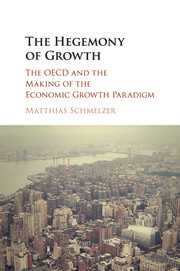Crossref Citations
This Book has been
cited by the following publications. This list is generated based on data provided by Crossref.
2016.
Books Received (Current as of Winter 2017).
Review of Radical Political Economics,
Vol. 48,
Issue. 4,
p.
685.
Schmelzer, Matthias
2017.
‘Born in the corridors of the OECD’: the forgotten origins of the Club of Rome, transnational networks, and the 1970s in global history.
Journal of Global History,
Vol. 12,
Issue. 1,
p.
26.
Selva, Simone
2017.
Before the Neoliberal Turn.
p.
197.
Gayon, Vincent
2017.
Debating International Keynesianism: The Sense of the Acceptable and the Neoliberal Turn at the OECD.
Annales. Histoire, Sciences Sociales,
Vol. 72,
Issue. 1,
p.
113.
Gross, Stephen G.
2017.
Reimagining Energy and Growth: Decoupling and the Rise of a New Energy Paradigm in West Germany, 1973–1986.
Central European History,
Vol. 50,
Issue. 4,
p.
514.
Coyle, Diane
2017.
The Future of the National Accounts: Statistics and the Democratic Conversation.
Review of Income and Wealth,
Vol. 63,
Issue. s2,
2017.
Books Received (Current as of Summer 2017).
Review of Radical Political Economics,
Vol. 49,
Issue. 3,
p.
501.
Meyer, Jan-Henrik
2017.
Who should pay for pollution? The OECD, the European Communities and the emergence of environmental policy in the early 1970s.
European Review of History: Revue européenne d'histoire,
Vol. 24,
Issue. 3,
p.
377.
Koch, Max
2017.
Die Naturalisierung des Wachstums in Produktion und Konsumtion.
PROKLA. Zeitschrift für kritische Sozialwissenschaft,
Vol. 47,
Issue. 189,
Neusiedl, Christoph
2017.
The deep marketisation of development in Bangladesh.
Third World Quarterly,
Vol. 38,
Issue. 7,
p.
1639.
Schmelzer, Matthias
2017.
Die Innenwelt der Ökonomie.
p.
287.
Thompson, Andrew
2018.
Transforming Education.
p.
107.
Assaf, Matheus
and
Garcia Duarte, Pedro
2018.
Utility Matters: Edmond Malinvaud and Growth Theory in the 1950s and 1960s.
SSRN Electronic Journal ,
Kallis, Giorgos
Kostakis, Vasilis
Lange, Steffen
Muraca, Barbara
Paulson, Susan
and
Schmelzer, Matthias
2018.
Research On Degrowth.
Annual Review of Environment and Resources,
Vol. 43,
Issue. 1,
p.
291.
Koch, Max
2018.
The Naturalisation of Growth: Marx, the Regulation Approach and Bourdieu.
Environmental Values,
Vol. 27,
Issue. 1,
p.
9.
Mahon, Rianne
2018.
Through a fractured gaze: The OECD, the World Bank and transnational care chains.
Current Sociology,
Vol. 66,
Issue. 4,
p.
562.
2018.
Books Received (Current as of Spring 2018).
Review of Radical Political Economics,
Vol. 50,
Issue. 1,
p.
222.
Rössner, Philipp Robinson
2018.
MONETARY THEORY AND CAMERALIST ECONOMIC MANAGEMENT, C. 1500–1900 A.D..
Journal of the History of Economic Thought,
Vol. 40,
Issue. 1,
p.
99.
Rössner, Philipp Robinson
2018.
Historia magistra vitae – ad acta oder ad nauseam?.
Zeitschrift für Historische Forschung,
Vol. 45,
Issue. 4,
p.
651.
Zeigermann, Ulrike
2018.
Akteure in Sekretariaten internationaler Organisationen. Das OECD-Sekretariat im Kontext der Policy Coherence for Development-Debatte.
der moderne staat – Zeitschrift für Public Policy, Recht und Management,
Vol. 11,
Issue. 2-2018,
p.
367.



